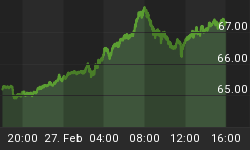I suppose it is more interesting to have a whole plateful of interesting news and data to look at than to be fixated on one thing (say, Europe), but it does make it much harder to figure out what things the markets will take seriously. Note that this is distinct from the things that the markets should take seriously. For example, Initial Claims launched higher today, to 388k, the highest level since June. This was clearly a correction from the incredible drop last week, which was the result of an error. In the mountain-to-molehill continuum, this definitely falls on the "molehill side," as did the drop last week, but S&Ps rose 8 points on the release last week (which was obviously flawed) and dropped a mere 2.5 today on the reversal. Maybe that should tell us something about sentiment, but as investors we really ought to be ignoring both of them and focusing on the fact that the true run rate of 'Claims seems to be pretty stable at around 365k-375k, and hasn't improved measurably since January. To be sure, that doesn't mean it isn't about to improve. In 2011, Claims were basically stable around 420k until October, and then improved into the end of the year to about the current level (see Chart, source Bloomberg).

We also shouldn't worry too much about Vikram Pandit, the ousted CEO of Citigroup. It makes good voyeuristic television to wonder about why Mr. Pandit was dismissed and to go back and forth about his reputation, but it doesn't mean anything for most of us. It probably doesn't even mean very much for Citi. The 1980s-90s global giant überbank model is dying, as I first predicted back in 2008 it would. It's a very simple analysis: lower turnover, smaller margins, and less leverage means lower return on equity. It does so by definition, since these are the three components of the DuPont model. And, since at least 2008, the trends were really obvious: regulators are demanding less leverage, and have decimated off-balance-sheet leverage so that the effect is larger than it seems; turnover was almost surely going to ebb because banks were weaker and customers more cautious; and margins were going to be depressed by the evisceration of truly structured business and movements of most products to exchanges. To be fair, we didn't know Dodd-Frank was going to enshrine these trends in legislation, but it was obvious where they had to go. So big banks will rally, big banks will sell off, but the fundamental pressures on the business means that banks will need to shrink and specialize to survive. So Mr. Pandit? He could no more have saved Citi in its current form than he could have turned back the tides, and neither will the next CEO.
The formal establishment of the ESM, with a tiny sliver (~$32bln) of leverage-able capital, could potentially mean more, but only if it's used intelligently. On past history, that seems unlikely, but in any event until it is used it doesn't mean anything. I guess it means more than the two items above.
What about the rotten mid-day earnings from Google (horrendous) and Microsoft after the bell (awful)? Now, when the analysts tell us not to worry because something isn't very meaningful, that's when I start wondering about how important it is. I should say I couldn't care less about either of these companies. I still can't figure out how Google makes $36.5 billion (in 2011) from search. Who actually clicks on those ads? I once used a Google placement to try and sell my book. I generated millions of impressions, a couple hundred clicks, and sold one book. The campaign cost me $200. It was mainly an education expense because I was curious how it worked. It doesn't. Oh, I'm sure you can sell some product through cute banner ads, but it's only attractive if it's dirt cheap. And if it's dirt cheap, how do you sell $36.5bln of it? Even more, how do you keep growing that chunk, when it is getting harder and harder to keep attention on any given website or search engine? As I said, I don't understand Google's business and I don't much care about the results. I understand Microsoft's business a bit better, since it's essentially a slow-growing industrial concern now that churns out a set of products (buggy software) that dominate their niches. But it still doesn't matter to me, because I don't own MSFT (or GOOG or C, for that matter), and likely never will.
But does it matter to the market? It's only Microsoft and Google, right? Sure, and it was only Stonewall Jackson who got killed at the Battle of Chancellorsville. It matters when the generals fall, especially late in the year. I'm not saying it means that stocks are going straight down, but it is not a good thing, and it may matter.
.
The 30y TIPS auction today doesn't matter to most observers, but it matters to me. The auction was good, better than was widely feared. After all, the last few TIPS auctions have looked very weak, and this was $7bln of a 30-year accreting issue. It's a lot of duration (roughly the equivalent of $19bln 10-year TIPS), but the market needs duration in inflation-linked product. Last year, the Fed took out of the TIPS market as much as the Treasury was increasing issuance in that sector, which is one of the reasons that TIPS yields are as low as they are. There is a shortage of inflation-linked paper (and a great opportunity to issue, incidentally, although corporate issuers in the U.S. are always remarkably reticent to issue real bonds for some reason), and especially at the long end of the curve where inflation matters more than at the 5-year point. Not every TIPS bond auction has gone well, or will go well, but it doesn't surprise me much when they do.















